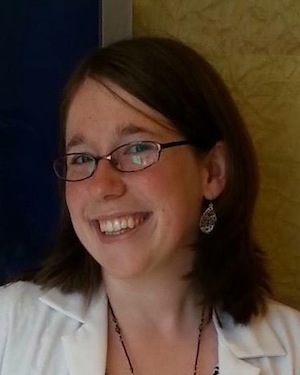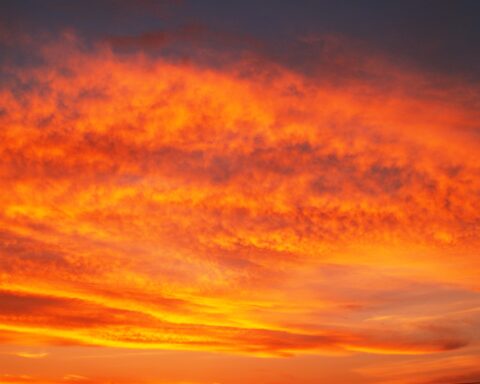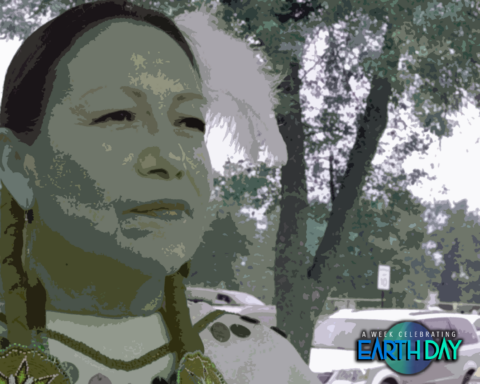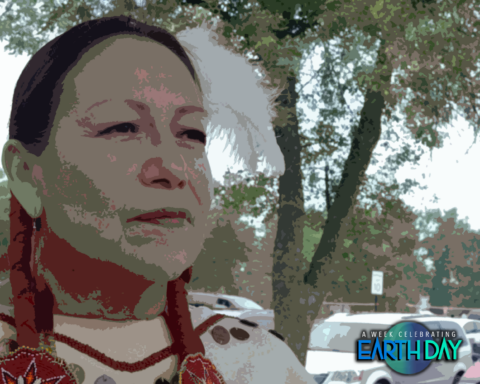Prophetic Hope in an Apocalyptic World

“This is the way the world ends
This is the way the world ends
This is the way the world ends
Not with a bang but with a whimper.”
These famous lines from the end of T.S. Eliot’s poem “The Hollow Men” have been running through my head recently, particularly as I’ve been putting together this issue of Unbound.
Maybe that’s not all that surprising. After all, many would argue that these lines make up the most well-known stanza of Eliot’s poetry. Not to mention the fact that they seem to fit rather logically with this issue’s theme climate change and eschatology. Even if, as later interviews with the poet would reveal, Eliot’s words were not meant to refer to environmental catastrophe, nuclear holocaust, or any other apocalypse scenario, they’ve certainly been employed by many an apocalyptic imagination. Whether we’re wandering in the realm of religion, science, or even pop culture, we can find predictions of life as we know it going up in a bang – as well as the equally if not more frightening alternative that it could just all fade away in a quiet whimper.
___________________________________________
Whether we’re wandering in the realm of religion, science, or even pop culture, we can find predictions of life as we know it going up in a bang – as well as the equally if not more frightening alternative that it could just all fade away in a quiet whimper.
___________________________________________
 So is this where we are with climate change? That facts and statistics certainly have an apocalyptic urgency to them. As other authors in this series will explore in more detail, the facts are basically on the table. 97% of climate scientists agree that global warming over the past century is very likely due to human activity. They also believe there is a way to stop it, but it requires fast and decisive action: Drastically reduce carbon emissions by 2020. Obtain most of our energy from renewable fuel sources by 2050. Be completely fossil fuel free by 2100.
So is this where we are with climate change? That facts and statistics certainly have an apocalyptic urgency to them. As other authors in this series will explore in more detail, the facts are basically on the table. 97% of climate scientists agree that global warming over the past century is very likely due to human activity. They also believe there is a way to stop it, but it requires fast and decisive action: Drastically reduce carbon emissions by 2020. Obtain most of our energy from renewable fuel sources by 2050. Be completely fossil fuel free by 2100.
Lest our eyes begin to glaze over from numbers and what seems like a distant future, let me point out that children starting kindergarten this year will finish 5th grade in the year 2020. When 2050 rolls around, I will not yet be eligible to retire. Many young children who are already born will live to see the year 2100. Yes, there is an urgency of apocalyptic proportions!
And it’s clear to me that our culture feels it. Movies about environmental catastrophe are a dime a dozen: 2012, The Day After Tomorrow, Wall-E, and the recent Noah come to mind at first thought. Even when not directly related to environmental apocalypse, we can rattle off the list of end-of-the-world scenarios in popular culture and imagination – be it zombies, aliens, nuclear warfare, asteroids, deadly disease pandemics. Something within us hears the resonance of this apocalyptic urgency, whether from religious, scientific, or other circles, and we flock to it. Perhaps, I suspect because it’s easier to cope with it on the screen than in real life.
___________________________________________
The reality we are confronting today seems to be far more ominous, far more urgent. Though of course, an important difference between the death-of-the-sun apocalyptic scenario and that of climate change is that we can have a hand in preventing the latter.
___________________________________________
When I was in elementary school, we were taught that the inevitable “death” (read: explosion) of the sun would be the end of life on earth. That was apocalyptic enough for my 8-year-old self. That was before the adoption of the Kyoto protocols, before consensus among climate scientists concerning global warming was so universal. The reality we are confronting today seems to be far more ominous, far more urgent. Though of course, an important difference between the death-of-the-sun apocalyptic scenario and that of climate change is that we can have a hand in preventing the latter.

And it’s not just the temperature increase itself that scares us. It’s the consequences we know – sea level rises causing loss of land, destruction of ecosystems, scarcity of food and water, resource wars, superstorms – and the perhaps even more frightening consequences that we don’t yet know.
This is the way the world ends
Not with a bang but with a whimper.
Personally, neither of those options sounds too promising. And as Christians, we have another problem: the classic question of theodicy. What do we who have come to know God in the person of Jesus Christ make of a whimpering world? What of God’s age-old promise that God will never leave or forsake God’s people? What do the visions in Isaiah of the Peaceable Kingdom, or swords being beaten into plowshares have to say to destruction of ecosystems, species extinction, and resource wars? Or what about the end of Revelation, where God makes God’s home on earth among the people?
___________________________________________
What do we who have come to know God in the person of Jesus Christ make of a whimpering world?
___________________________________________
Whether or not we’re inclined to take these visions literally or to read them as stories written to convey metaphorical and theological truths, it’s easy to see how they conflict with potential future realities that unmitigated climate change is predicted to bring. As Christians who take the discoveries and predictions of science seriously, what are we to make of this?

Here we arrive at the question of eschatology, a theological discipline that many of us who identify as progressive, mainline Christians are hesitant to probe. Eschatology asks questions about the end of history, what God will do at the end of time. Or perhaps put differently, what is God’s ultimate vision for Creation? Where do we as humans fit into that vision?
It’s important to remember that while apocalyptic scenarios of how “the end” will play out, seem to attract the most attention, not all eschatology is apocalyptic. Not all visions of God’s ultimate plan for Creation involve a catastrophe from which we are unable to free ourselves, a disaster that requires extraordinary divine intervention. Apocalyptic thinking points us to the seriousness of the crisis at hand – and to our absolute dependence on God for deliverance. But it doesn’t give us the full picture of eschatology.
And, I would argue, our eschatological understanding of climate change doesn’t have to deprive us of moral agency.
___________________________________________
Intimately related to our understanding of eschatology is our understanding of hope.
___________________________________________
Intimately related to our understanding of eschatology is our understanding of hope. In several conversations this past week, questions of hope have come up. “Do you have hope?” “In the face of difficult and heartbreaking situations, is a Christian required to have hope?”
I think they’re completely legitimate questions. On one hand, one might argue that the possibility of mitigating climate change looks pretty bleak, perhaps even ‘hopeless’. Each day takes us closer to the point where climate change becomes irreversible. Even though shifting from fossil fuels to renewable energy sources is scientifically-backed as feasible, the current obstacles to the process can make it look like an insurmountable political struggle. In the midst of all this, how can we be called upon to have hope for the future?
 But maybe we’re misunderstanding this idea of hope. When my friend David LaMotte gives talks and workshops on activism and citizen engagement, he often starts but clearing up some common misunderstandings about hope. Namely, he argues that hope and optimism are not synonymous. “Hope,” David argues in his upcoming book (www.worldchanging101.com) is the conscious decision to live toward the world you would like to see… It begins with an honest assessment of a given situation, but it grows into a conscious choice to lend your own energy to move that situation in a better direction.” Hope, in David’s view, is “both an active choice and a choice to be active.”
But maybe we’re misunderstanding this idea of hope. When my friend David LaMotte gives talks and workshops on activism and citizen engagement, he often starts but clearing up some common misunderstandings about hope. Namely, he argues that hope and optimism are not synonymous. “Hope,” David argues in his upcoming book (www.worldchanging101.com) is the conscious decision to live toward the world you would like to see… It begins with an honest assessment of a given situation, but it grows into a conscious choice to lend your own energy to move that situation in a better direction.” Hope, in David’s view, is “both an active choice and a choice to be active.”
In the language of the Christian tradition, I believe that hope is a prophetic discipline. It means engaging in action, taking up the responsibility of our own God-given moral agency. And I’m not so sure that this prophetic hope calling us to action is all that incongruent with our apocalyptic dependence on God for that hope to be fulfilled.
___________________________________________
Lest we forget, we who have the option to sit around and debate bangs and whimpers are people of privilege in the global community.
___________________________________________
This issue of Unbound will take a deep look at climate change and the many related environmental issues from the perspective of Christian eschatology and hope. Some authors will explore the theological implications both of climate-change-related issues and of our pop culture fixation on the apocalyptic.

Others will lift up the critical environmental issues that we are called to attend to, both with prophetic hope and apocalyptic urgency. Some will share stories of ways people are already living out that active choice of hope – and some ways that we, too, can get involved.
And lest we forget, we who have the option to sit around and debate bangs and whimpers are people of privilege in the global community. Several of our authors live and work in places where the effects of global climate change are already taking effect, both in the U.S. and in countries around the world. They’ll share with us what hope and faithful discipleship look like in their own contexts.
So is there cause for hope between the bang and the whimper? I guess, ultimately, that depends on us.
Read more articles in this series!





Unbound Social